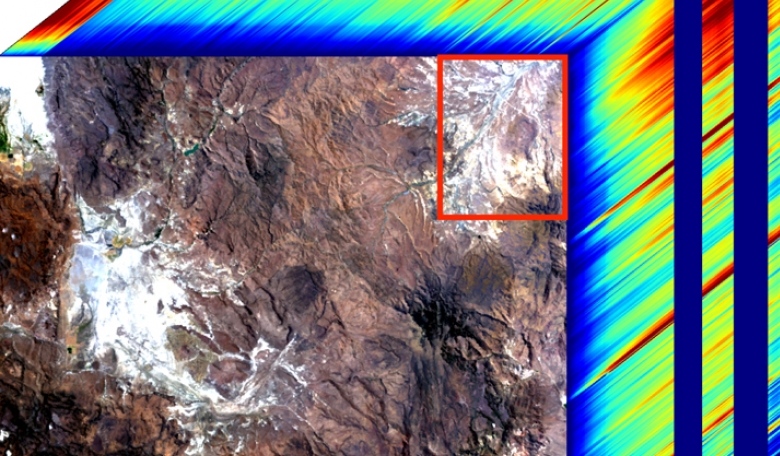Critical elements of a new instrument attached to the International Space Station (ISS) this summer, and designed to examine the chemical composition of atmospheric mineral dust, is powered by hardware from high-performance electronics company Alpha Data.
Data gathered by the NASA instrument - called the Earth Surface Mineral Dust Source Investigation (EMIT) - as the Space Station orbits Earth, will help scientists understand more about how deserts and arid regions affect climate.
Flown to the ISS on 14 July aboard a SpaceX Dragon cargo capsule, EMIT was installed on the Space Station's truss a week later and made its first measurements on 28 July. The instrument features mission-critical Alpha Data hardware developed in a partnership with NASA’s Jet Propulsion Laboratory (JPL).
“EMIT consists of a state-of-the-art imaging spectrometer capable of investigating visible and infrared spectra to determine the makeup of mineral dust clouds. It will fill a critical gap in our understanding of Earth’s atmosphere and factors driving climate change,” says Senior FPGA, Electronics, and Software Design Engineer David Dolman. “This instrument sets a new standard in high-performance onboard processing - in compression and cloud screen - as well as storage of data.”
The FPIE-D (Focal Plane Interface Electronics – Digital) provided by Alpha Data plays a critical interface role between the spectrometer, the ISS and ground teams. Scanning continuously over 328 spectral bands, Alpha Data’s FPIE-D can handle high data rates whilst operating in a hostile, high-radiation environment. The rugged electronic package digitizes, stores and relays detailed images of target regions, built up as the orbit of the ISS crosses an area of interest.”
The high-performance FPIE-D hardware was designed and its manufacture managed by Alpha Data Inc in Littleton, Colorado, while the software and firmware that runs and configures the Adaptive SoC FPGA (System-on-a-Chip Field-Programmable Gate Array)-based system was developed by Alpha Data specialists at its headquarters in Edinburgh, Scotland. The overall instrument was also architected by Alpha Data in Scotland.
The EMIT FPIE-D board design is based on a standard Alpha Data COTS (Commercial Off-The-Shelf) Zynq7100 board in an XMC form factor. The COTS board was re-spun to make it suitable for space (replacing components with space grade equivalents where needed) and to add features needed for the EMIT mission that were not available on the COTS product.
Alpha Data’s development of EMIT’s FPIE-D board, in conjunction with the Jet Propulsion Laboratory (JPL), Correct Designs and Mercury Systems, involved extensive original Research & Development which the company says will be transferable to future projects requiring space-proved data acquisition, cloud-screening, compression, storage and downlink systems.
EMIT is focused on mapping the mineral dust composition of Earth's arid regions to better understand how dust affects climate heating and cooling. The instrument works by measuring the hundreds of wavelengths of light reflected from materials on Earth. Different substances reflect different wavelengths of light, producing a kind of spectral fingerprint that, when collected by an imaging spectrometer and analyzed by researchers, reveal what they are made of.
“Decades ago, when I was in graduate school, it took 10 minutes to collect a single spectrum from a geological sample in the laboratory. EMIT’s imaging spectrometer measures 300,000 spectra per second, with superior quality,” said Robert Green, EMIT’s principal investigator and senior research scientist at JPL.
“The data we’re getting from EMIT will give us more insight into the heating and cooling of Earth, and the role mineral dust plays in that cycle. It’s promising to see the amount of data we’re getting from the mission in such a short time,” said Kate Calvin, NASA’s chief scientist and senior climate advisor
EMIT will gather billions of new spectroscopic measurements across six continents, closing this gap in knowledge and advancing climate science. “With this exceptional performance, we are on track to comprehensively map the minerals of Earth’s arid regions – about 25% of the Earth’s land surface – in less than a year and achieve our climate science objectives,” Green said.
“The successful deployment of EMIT is a landmark achievement for Alpha Data and further strengthens its historic relationship with NASA JPL,” adds David Miller, Managing Director at Alpha Data. “Alpha Data has been providing rugged Commercial-Off-The-Shelf (COTS) and Modified Commercial-Off-The-Shelf (MCOTS) components to JPL and accompanied EMIT from the drawing board through to deployment and beyond to make the most of our reprogrammable FPGA hardware.”
The FPIE-D featured on EMIT showcases the unrivalled ability of Alpha Data’s development frameworks to produce high-reliability, space-grade off-the-shelf electronics. These reprogrammable, radiation-tolerant kits are suitable for a variety of demanding uses with stringent certification processes, ranging from laboratory conditions to long-term operation in Earth orbit.
From its vantage point on the ISS, EMIT is now delivering never-before-seen data, detailing how mineral dusts clouds carried by high winds from arid regions over vast distances may cool or heat the atmosphere as they travel, with dark particles absorbing sunlight for a heating effect and light-colored particles providing a cooling effect.
Alpha Data, founded in 1993 in Edinburgh, is the industry-leading provider of space-ready Commercial Off-The-Shelf performance computing solutions.
NASA’s climate change mineral dust detector











